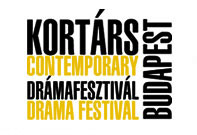2 December 7.30 pm
Új Színház (Budapest, VI., Paulay Ede u. 35.)
René Pollesch: When can I finally go into a Supermarket and buy Everything I Need only by my good Look
Performed by: Silja Bächli, Christian Brey, Katja Bürkle, Bijan Zamani
Set: Chasper Bertschinger
Costume: Anette Hachmann, Elisa Limberg
Video: Alexander Schmidt
Dramaturg: Christian Holtzhauer
Prompter and assistant: Stephanie Manz
Director: René Pollesch
First performance29th April 2006, Schauspiel Stuttgart /Staatstheater Stuttgart
Supporter of the guest performance: Goethe Institut Ungarn
“I would be really glad if you could say: ‘To hell with poverty’. But even if you said that, it would mean that love is still there, that you can still count on it, that in love, we are still all equal. But you know what? To hell with this concept that love makes us equal, that it is a form of integration. We are not equal in love either. Love is more like the last ray of hope that everybody hangs onto, ever since this damned nation went down forever. And there you go! To hell with nation, to hell with love. The only place where we are equal is madness. We are only equal in this place where we don’t go. Get this form of integration! To go where we don’t go, to be where we can’t be! Nobody!” (René Pollesch)
René Pollesch (born in 1962) is a dramatist, theatre director and Artistic Director of the Volksbühne Prater in Berlin. Prater Trilogy featured at the prominent Berliner Theatertreffen in 2002. In the same year, theatre critics of Theater Heute named her “Best Dramatist of the Year”, and in 2006, she was winner of the Mühlheimer Dramatikerpreis Prize for “Best Play”. The play was commissioned by Schauspiel Stuttgart, the most progressive prose theatre in Germany.
In her 4th Stuttgart production, Pollesch uses her recurrent themes: drugs, love and technology. The only thing she’s changed is the perspective, which brought on a new theme: identity. The creation of identity, when you ask, for example: “Who am I when I am wearing polyester tracksuit?”
The title says a lot about Pollesch’s radically innovative theatre. It is more about collecting bits and pieces and lining them up, than fake, artistic polishing and fitting things together that don’t really fit. This is the theatre of questions, which does not give you answers and obvious messages. Rather it gets the obvious and takes it into pieces.”
(Stuttgarter Zeitung)

















